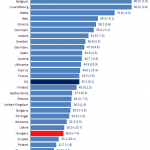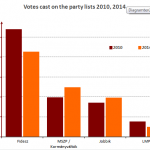Analyses

Key findings:
1. The strengthening of extremism is an important signal, but the EU-committed “mainstream” remains strong. If the notion of the crisis becomes stronger within the EU, the prediction of “Europe will fall” can fulfill itself.
2. Since the Eurosceptic parties often admit their Russian commitment, it is an open secret that their larger proportion of mandates can definitely strengthen Russian influence in Europe. Besides the Russian world power and regional issues, these parties are staunch proponents of key Russian energy industry interests too.
3. The votes of the 12 Fidesz MEPs …

The Hungarian parliamentary election has left only one question open, whether the governing party can retain its two-thirds majority in Parliament or not. This question can remain open by 12 April, until the finalization of the election results. It has a real political significance: the two-thirds majority is the only thing that Fidesz can lose as the result of the election. But anyway, no serious change is expected in governmental policies…
Fidesz has implemented the most significant changes in the electoral system since the transition in 1989-1990. Below, we summarize the most important changes based on their impact on the electoral results. To sum up, we can say that the April 6 elections will be free but not fair: there are several changes in the system that benefit Fidesz – but it does not mean that Fidesz cannot be defeated at the polls.
In July 2013 it seems we have come to the end of a three-year process of electoral reform, but slight modifications may yet follow. Since the three new laws regulating Parliamentary elections (CCIII/2011 Voting Rights Act, XXXVI/2013 Electoral Procedure Act and LXXXVII/2013 Campaign Finance Act) have already been amended several times by the Fidesz-KDNP alliance, it is possible there will be additional changes made during the next Parliamentary session starting September 9.

It will be argued here that extending citizenship to Hungarian minorities abroad, supplementing the citizenship of non-residents with voting rights, and the attempt to introduce active registration appear to serve the same purpose: preserving and enhancing the power of the ruling coalition. A paper by ANDRÁS BOZÓKI.
On 4 January 2013 Hungary’s Constitutional Court (CC) struck down the most important provision of the electoral procedural law, after president János Áder sent the bill to the CC for a constitutional review. The government has accepted the court’s decision, so a significantly more media-focused campaign than originally envisioned by the governing party is expected. With the voter registration and the campaign ad limitations Fidesz wanted to focus on its core voters in the campaign via personal mobilization, but the current decision means that much bigger emphasis will be put …
With a two-thirds majority in parliament, Hungary’s governing party alliance, Fidesz-KDNP, has created a completely new electoral system. The new electoral law was passed on 23 December 2011, and – among other things – has shifted the system towards the majoritarian principle: The proportion of single-member constituency mandates was increased from 45 percent to 53 percent, and a quite complex compensation mechanism was introduced, which compensates not only the losing candidate’s party but also the winner’s. In addition, the law endowed Hungarian citizens living abroad with electoral rights, reduced the …
With the new electoral procedures act the governing party, Fidesz does its best to increase its chances of winning the 2014 general election with a combination of its heavily eroded voter base with Hungarian residence and non-resident Hungarian citizens. Preliminary registration may discourage a considerable number of unpredictable and disillusioned voters from going to the polls. Opposition parties will face an uphill battle trying to mobilise their potential voter base facing extremely restrictive campaign rules.
As an expected consequence of leading governing party Fidesz’s efforts to improve their 2014 election prospects by administrative means, mandatory registration will be introduced in the new electoral procedural law planned to be passed by November. The new institution is likely to rule out voters who are reluctant to go through the bureaucratic process in time. Even though the text of the act has not yet been published, a remarkably wide range of constitutional lawyers warn that the plans announced can be unconstitutional.

